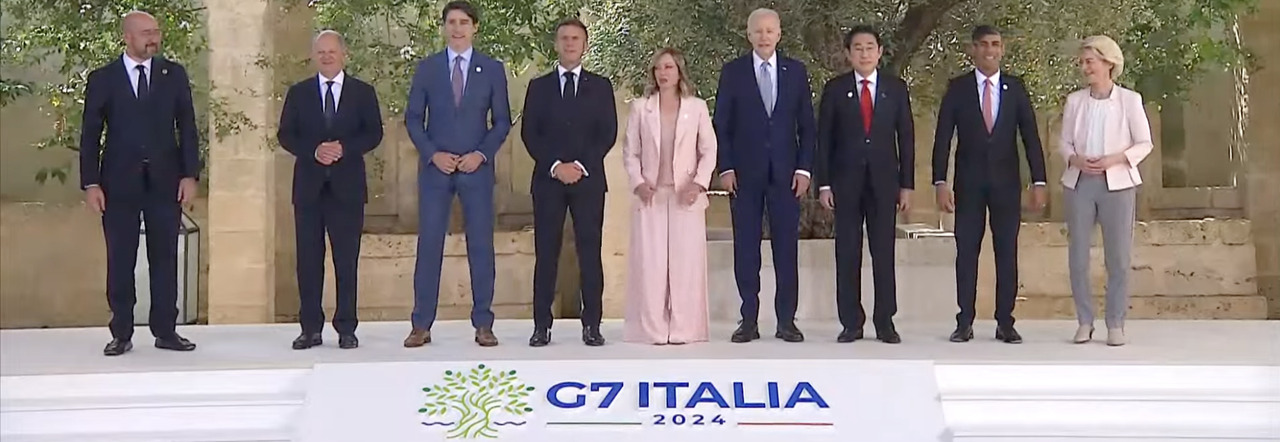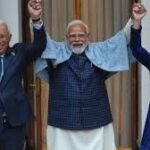Giorgia Meloni, emergence as the most powerful leader in G-7, leader of the Brothers of Italy (Fratelli d’Italia) party, has seen a meteoric rise in Italian and Global politics. As the first far-right leader to take the helm of Italy since World War II, her ascent signals a significant shift in the political landscape of not only Italy but potentially the broader G-7 group of industrialized nations. As other G-7 countries face electoral cycles and political upheavals, Meloni’s position might become more influential.

The Group of Seven (G-7) includes Canada, France, Germany, Italy, Japan, the United Kingdom, and the United States. Each of these countries is currently experiencing its own unique political challenges, many of which could pave the way for more far-right ideologies to gain traction.
France, under President Emmanuel Macron, has faced significant political challenges, including the Yellow Vests movement and ongoing protests over pension reforms. With Marine Le Pen’s National Rally (Rassemblement National) gaining ground, there is a palpable shift towards right-wing populism. Le Pen has repeatedly emphasized national sovereignty, immigration control, and traditional values, themes resonant with Meloni’s own platform.
Germany’s political landscape has also seen a rise in right-wing sentiments, especially with the Alternative for Germany (AfD) party gaining momentum. The AfD’s success in regional elections indicates a growing disenchantment with mainstream parties. Although Chancellor Olaf Scholz from the Social Democrats currently leads, the increasing support for the AfD suggests a potential shift in future elections.
The UK has experienced significant political turmoil post-Brexit. The Conservative Party, under Prime Minister Rishi Sunak, has moved towards more right-leaning policies, particularly on immigration and national sovereignty. The far-right ideology, particularly concerning anti-immigration sentiment and national identity, has found fertile ground in post-Brexit Britain.
In the United States, former President Donald Trump’s tenure marked a significant shift towards populist and nationalist policies. Although Joe Biden, a Democrat, is currently in office, Trump’s influence remains strong within the Republican Party, which has significant support among the American populace. The ideological battle between progressive and conservative values continues to shape American politics, with far-right ideologies maintaining a robust presence.
Japan and Canada have relatively stable political environments compared to their G-7 counterparts. However, even in these nations, there are undercurrents of right-wing nationalism. In Japan, Prime Minister Fumio Kishida has upheld many conservative policies, and there is a growing discourse on national security and constitutional amendments. In Canada, while Prime Minister Justin Trudeau leads a centrist government, far-right groups have been vocal, particularly on issues like immigration and national identity.
Meloni’s leadership represents a consolidation of far-right ideologies within a major European economy. Her platform focuses on national sovereignty, traditional values, and stringent immigration policies, echoing themes prevalent across other far-right movements in G-7 nations. This ideological alignment can facilitate stronger ties and coordinated policies among right-leaning leaders, enhancing Meloni’s influence.
As other G-7 leaders face elections and potential political upheavals, Meloni’s relatively stable position in Italy could provide her with a continuity of leadership that others might lack. This stability allows for sustained policy implementation and international negotiation, positioning her as a steadfast figure in the G-7.
Italy, as the third-largest economy in the Eurozone, holds significant economic influence. Meloni’s policies aimed at economic revitalization and national interest can bolster Italy’s economic standing, giving her greater leverage within the G-7. Additionally, her stance on EU reforms and relations with non-EU countries could reshape geopolitical dynamics, particularly in Europe.
Meloni advocates for a redefined European identity that prioritizes cultural heritage and national sovereignty over multiculturalism. This vision resonates with far-right movements across Europe, potentially garnering support from like-minded leaders and populations. Her role could be pivotal in shaping a new ideological direction for Europe, influencing broader G-7 policies.
Meloni’s rise is not without opposition. Domestically, she faces resistance from left-leaning and centrist parties. Internationally, other G-7 leaders, particularly those with more centrist or left-leaning policies, might oppose her far-right stance. This opposition could limit her influence and ability to push through her agenda unchallenged.
Italy’s economic challenges, including high public debt and dependency on EU funding, could constrain Meloni’s policy ambitions. The need to balance nationalistic policies with economic realities might limit her ability to exert unrestrained influence.
Global dynamics, including the influence of non-G-7 nations and multinational organizations, also play a crucial role. Meloni’s far-right policies might clash with broader global trends towards cooperation and multilateralism, creating friction in international relations.
Giorgia Meloni’s potential emergence as the most powerful leader within the G-7 hinges on several factors, including the rise of far-right ideologies across member nations, her stable leadership in Italy, and her ability to navigate internal and external challenges. While her ideological alignment with other right-leaning movements can bolster her influence, opposition and economic constraints present significant hurdles. As the political landscapes of G-7 countries evolve, Meloni’s role will be pivotal in shaping the direction of this influential group, potentially redefining the balance of power and ideological orientation within the G-7.
4o





Leave a Reply